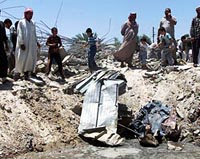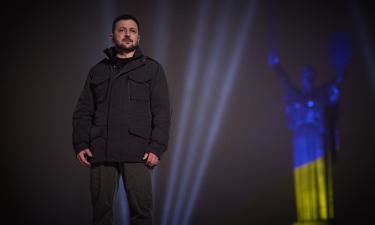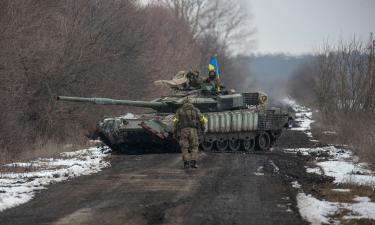18 Iraqis killed in attacks in Baghdad
At least 18 Iraqis were killed in attacks in Iraq on Tuesday, most of them in drive-by shootings in three provinces north of the capital, police said. The attacks came one day after Iraq's new prime minister, Nouri al-Maliki, and Britain's visiting leader, Tony Blair, announced that Iraqi security forces would start assuming full responsibility for some provinces and cities next month, beginning a process leading to the eventual withdrawal of all coalition forces.

They said "responsibility for much of Iraq's territorial security should have been transferred to Iraqi control" by December. At that point, al-Maliki said, two of Iraq's most violent provinces, Baghdad and Anbar, may be the last where coalition forces maintain control. But Tuesday's violence north of Baghdad showed that goal may not be easy to achieve.
At 8:00 a.m., gunmen riding in an Opel sedan car shot and killed four ironsmiths and wounded one as they were riding a pickup truck to work in Mosul, the capital of Ninevah province, said police Brig. Abdul-Hamid Khalaf. In a drive-by shooting, attackers killed three Iraqi day laborers and wounded four as they drove by a minibus to work at a farm near Baqouba, 60 kilometers (35 miles) northeast of Baghdad. Police said the casualties, all majority Shiites, appeared to be the latest victims of sectarian attacks by minority Sunni Arabs in Diyala province. Several hours later, gunmen in a speeding car killed three Iraqi men who were standing near a house in Baqouba, police said.
Nazar Qadir, 39, a high school teacher on his way to work near Kirkuk city in Tamim province 290 kilometers (180 miles) north of Baghdad, also died in a drive-by shooting.
On Jan. 31, a U.S. Embassy report had found security "critical" in Anbar province, the Sunni-dominated region west of Baghdad that includes Ramadi and Fallujah. The report also said the security situation was considered serious in the provinces of Baghdad, Basra, Ninevah, Tamim, Salahuddin and Diyala all of them religiously mixed.
Six Iraqis also died in the capital Tuesday, police said. A car bomb exploded in New Baghdad, killing five Iraqis, two police commandos and three civilians. The attack, which damaged nearby shops and cars, also wounded eight Iraqis: five commandos and three civilians.
A roadside bomb hit a minibus carrying workers to a textile factory in western Baghdad, killing one and wounding three others, said police 1st Lt. Maithem Abdel-Razaq In western Baghdad, a drive-by shooting killed one of the many vendors who sell cigarettes from small wooden stands alongside streets in the capital. A roadside bomb also damaged one Humvee in a U.S. convoy in Dora, one of Baghdad's most violent areas, and an Iraqi woman and a child were wounding in gunfire that followed.
A mortar shell landed near the heavily fortified Green Zone, wounding four civilians and damaging three cars, police said. The Green Zone, where Iraq's government meets and the U.S. and British embassies are based, is a frequent target of such attacks. During his news conference with Blair on Monday, al-Maliki was asked whether the surge in sectarian violence in Iraq, which has prompted thousands of Iraqis to flee their homes, is a civil war. "There are rebellious elements. There are gangs killing people. There are gangs that have used arms for political blackmailing or to achieve goals that have political dimensions," he said. "But those groups have failed to ignite a civil war."
On Monday, Iraq's Sunni Arab vice president, Tariq al-Hashimi, said the gradual assumption of security duties by Iraqi forces is a good opportunity for insurgents to discuss their future roles with the Americans and British. While maintained that Iraqis have a legitimate right to resist coalition occupation, he also said insurgents, most of whom are believed to be Sunnis, should consider talking to the Americans and British since there are "real signs" those nations apparently are considering eventually withdrawing their forces.
"Such signals are enough to sit down and discuss the ways for withdrawing these forces and what the role of the national resistance would be after restoring the sovereignty," al-Hashimi said on Baghdad TV, which is owned by his Iraqi Islamic Party. In another development, neighboring Jordan announced Monday the arrest of an unidentified al-Qaida in Iraq official who allegedly had kidnapped and killed Jordanians and Arabs, and robbed commercial trucks driving between the kingdom and Iraq.
The suspect was an Arab, most likely from Iraq, where he was arrested, said Jordanian security officials said on condition of anonymity because they were not authorized to speak to the media. In Baghdad, Lt. Col. Ali Rashid said Iraq's Interior Ministry had no information about the arrest and was not involved in the operation, reports the AP.
N.U.
Subscribe to Pravda.Ru Telegram channel, Facebook, RSS!





